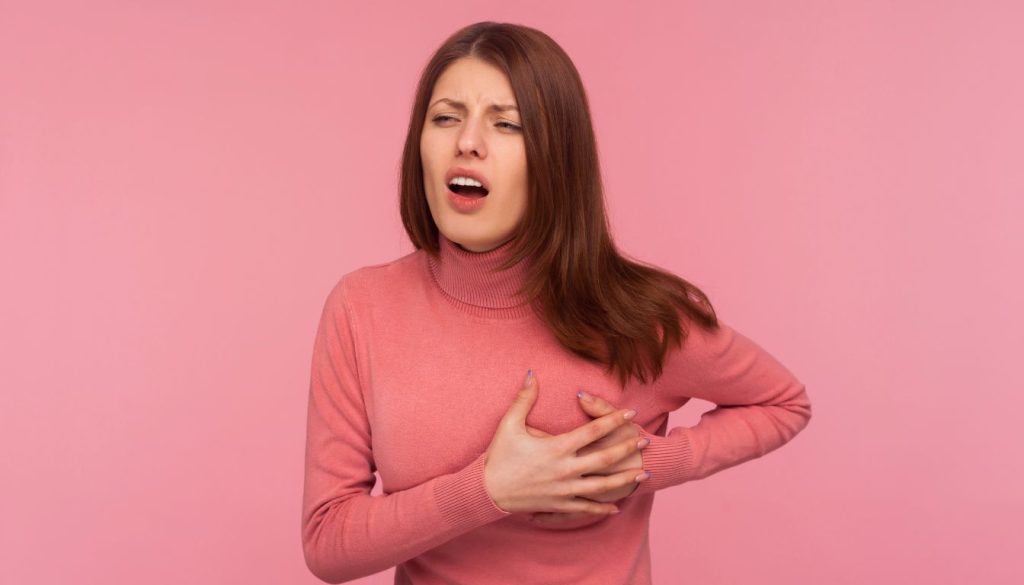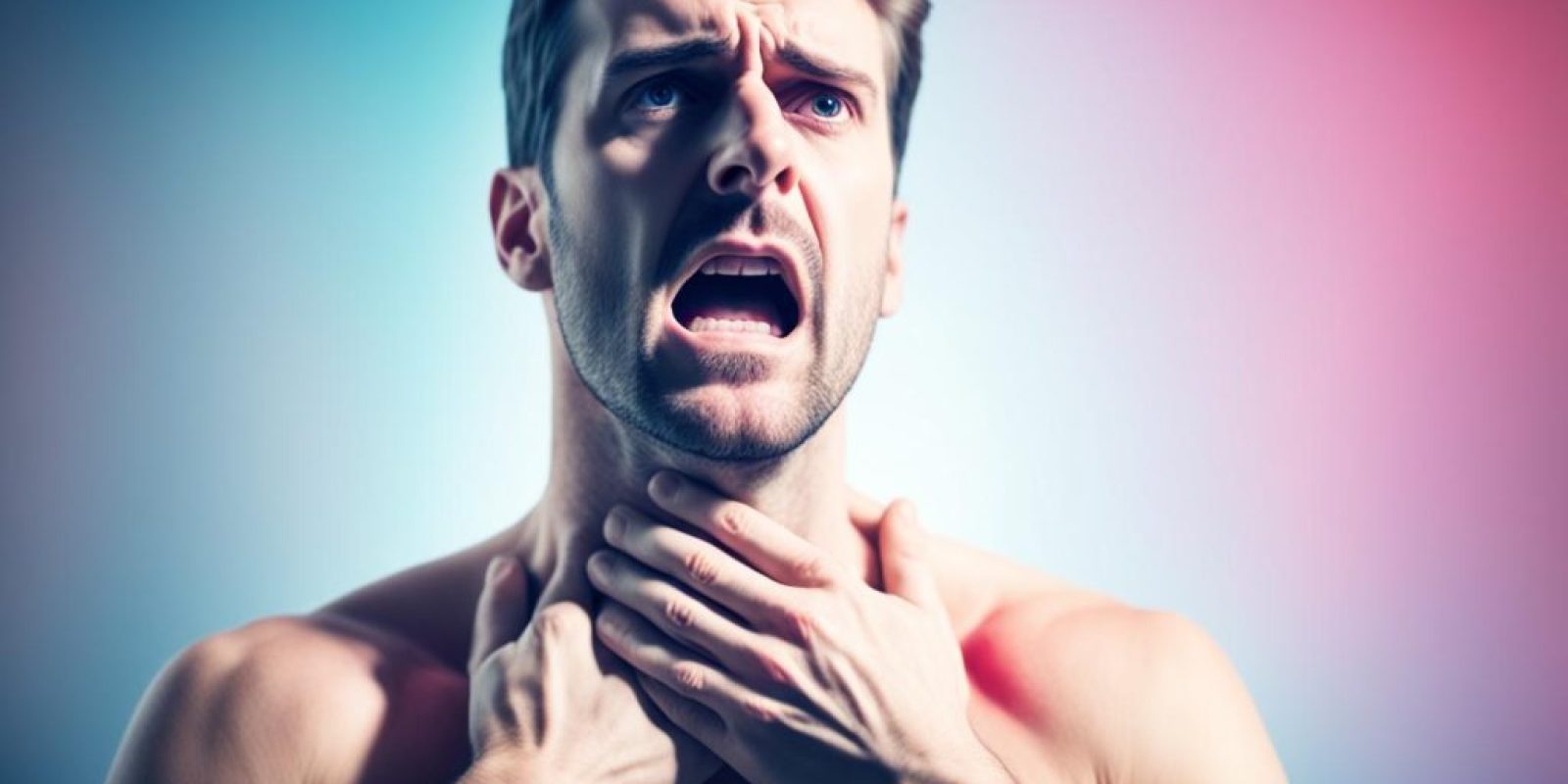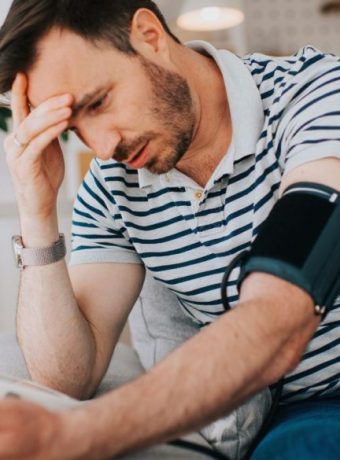Have you felt tightness in your chest when stressed, wondering if it’s your heart? You’re not alone.
Anxiety-induced chest pain is common but often misjudged. It affects many Americans.1,2
You might be wondering: Can anxiety cause chest pain? Yes, anxiety can cause chest pain.
In this article, you’ll learn how chest tightness from anxiety feels because it can be scary and very uncomfortable.
Key Takeaways
- Anxiety can cause physical symptoms, including chest pain.
- Anxiety disorders affect approximately 40 million Americans.
- Most emergency room visits for chest pain are not heart-related.
- Anxiety-induced chest pain can be sharp, persistent, or burning.
- It’s important to differentiate between anxiety and heart attack symptoms.
- Seeking medical attention for chest pain is always recommended.
What is Anxiety-Induced Chest Pain?
Anxiety-induced chest pain happens in panic attacks or high anxiety. It may feel like a stab or tightness in your chest.3
About 30% of adults will have an anxiety disorder in their lifetime.1
Chest discomfort from stress seems like a heart attack, getting people to the ER. Shockingly, 80% of ER chest pain cases are not from a heart attack.2
Anxiety is often the cause.
It’s important to link anxiety with chest pain for better health management. Anxiety can affect blood pressure and heart rate.
This activates the body’s stress response, causing symptoms like:
- Sweating
- Breathing quickly
- Aching chest pain
Can Anxiety Cause Chest Pain?

Yes, anxiety can cause chest pain, which often confuses people.
It’s a common problem in anxiety disorders. Many think it’s a heart attack, but most times it’s not.4
Nearly 58% of people think they’re having a heart attack due to severe anxiety.4
It’s key to tell anxiety pain apart from heart pain.
Anxiety chest pain starts suddenly but goes away after about 10 minutes.5
Heart pain feels like a tight squeeze and gets worse over time.5
Many who visit the emergency room because of chest pain find out it’s not their heart but their anxiety causing it. 6
The link between anxiety and chest pain is strong.
It’s found that 25 to 50 percent of people who come to the emergency room with chest pain have high levels of anxiety.7
This means many with chest pain are dealing with stress.
If someone has a panic disorder, they might feel chest pain during an attack.
This happens to 20% to 70% of them.8
Hence, it’s not unusual to find panic disorder in people who visit the ER for chest pain.8
Long-term anxiety can harm the heart due to constant stress.
It’s hard to tell if chest pain is from the heart or anxiety, but anxiety’s chest pain is often in one spot and comes suddenly.6
Always seek help if you have chest pain that won’t go away.
Also, 30% of heart attack patients don’t feel chest pain, so getting checked by a doctor is important.7
How Does Anxiety Affect the Body?
Anxiety is a complex response that affects the body in many ways.
Knowing these impacts is key to handling anxiety’s physical effects better.
During anxiety, your body starts the fight-or-flight response.
This prepares you to deal with possible dangers.
Your heart beats faster, blood pressure goes up, and muscles tighten.
All this can lead to pain in the chest because of the stress.9
1. Hormonal Changes During Anxiety
Anxiety makes your body release cortisol and adrenaline, the stress hormones.
This can make your heart race, sweat, and breathe faster.
With long-term anxiety, these high hormone levels might lead to heart problems and weaken your immune system9.
2. Physical Manifestations of Stress
Anxiety can show up as various physical symptoms.
You might feel tense, have trouble with your stomach, or not sleep well.
Some could even get specific phobias or social anxiety.
These can change how you live.10,11
It’s important to notice these signs of anxiety. If they last, seeing a doctor can help make a plan that is right for you.
Symptoms of Anxiety – Chest Pain
Anxiety symptoms can occur and make your chest feel tight in different ways.
It could be a dull pain or a sharp, sudden hurt.
You might feel something pressing on you or like you’re being stabbed.
These feelings can happen at any time, usually when you’re stressed.12
When you’re anxious, you might start breathing in a strange way.
This can worsen the chest pain, and your hands might even tingle.12
Luckily, this type of chest pain goes away as you relax.
A panic attack can make your chest hurt pretty badly.
You could feel like you can’t breathe, your heart is racing, you’re gonna throw up, sweating buckets, and shaking.13
It’s so bad that it feels like a heart attack, which is scary.
| Anxiety Chest Pain | Heart Attack |
|---|---|
| Often short-lived | Severe and persistent |
| Comes and goes with stress | Pain in jaw, shoulder, or arm |
| Pain in the jaw, shoulder, or arm | Sweating and shortness of breath |
It’s important to know that anxiety can make your chest hurt, but sometimes it’s not just anxiety.
Frequent anxiety or lasting pain should be checked by a doctor immediately.13
Your health and safety are the most important things.
Anxiety Chest Pain vs. Heart Attack
Telling apart anxiety and chest pain from a heart attack can be tough.
They both cause a lot of discomfort.
But knowing how anxiety, chest pain, and a heart attack are different is key.
It helps make smart choices about getting medical help, which is very important.
Characteristics of anxiety-induced chest pain
Anxiety attacks can make you feel anxious, which can lead to chest pain.
You might feel your heart beat fast or worry a lot.
Panic attacks are hard, affecting about 2.7% of people in the U.S.14
They can make your chest hurt. During one, your heart can race, making your chest hurt even more.14
This type of chest pain can be sharp and usually goes away quickly.15
Signs of a heart attack
Heart attacks are serious and happen to about 805,000 Americans each year.14
- The chest pain from a heart attack feels like pressure or squeezing.
- It can also spread to your jaw or arm.15
- Heart attack pain gets worse with activity and might stay or change.15
Not everyone feels just chest pain during a heart attack, especially women.
They may have trouble breathing or feel sick, with pain in their back or jaw.16
Wrapping Up
Because both anxiety and heart attacks are serious, it’s always better to be safe.
If you’re unsure or it’s your first time feeling chest pain, get help immediately.15
This advice is important for women.
They might not get the heart attack treatment they need.16
Heart disease kills more women than anything else.
Yet, people and even doctors often don’t think of it first.16
No matter what you think the cause is, you should seek immediate medical attention for your health.
FAQ
What is anxiety-induced chest pain?
Anxiety-induced chest pain is a symptom that many people feel during times of high stress. It can happen to 20-70% of people during a panic attack. This kind of chest pain can come from the heart or from things like tight muscles or not breathing normally.
Can anxiety really cause chest pain?
Yes, anxiety can cause chest pain in several ways. Your body’s fight-or-flight response to fear or stress can make your heart beat faster and harder. This might lead to chest pain. In rare cases, intense stress can even cause a heart-like condition. Long-term anxiety might also harm your heart in different ways.
How does anxiety affect the body physically?
When you’re anxious, your body gets ready to act fast. It releases adrenaline and cortisol, making your heart and blood vessels work harder. This can lead to muscle tightness, sweating, and trouble breathing. Stress can even make your heart blood vessels contract, which can cause chest pain.
What are the symptoms of anxiety-related chest pain?
Anxiety chest pain might feel sharp, throbbing, or like a burning sensation. You might also feel pressure or tightness in your chest. These feelings can come with dizziness, trouble breathing, sweating, and your heart beating faster than usual.
How can I differentiate between anxiety chest pain and a heart attack?
Anxiety chest pain and heart attack pain are different. The chest pain from anxiety is usually felt in just the chest. It often gets better in less than 10 minutes, even though you might keep feeling anxious. Real heart attack pain can spread to other parts of the body and get worse with movement. But, always get help if you have chest pain, just to be safe.




